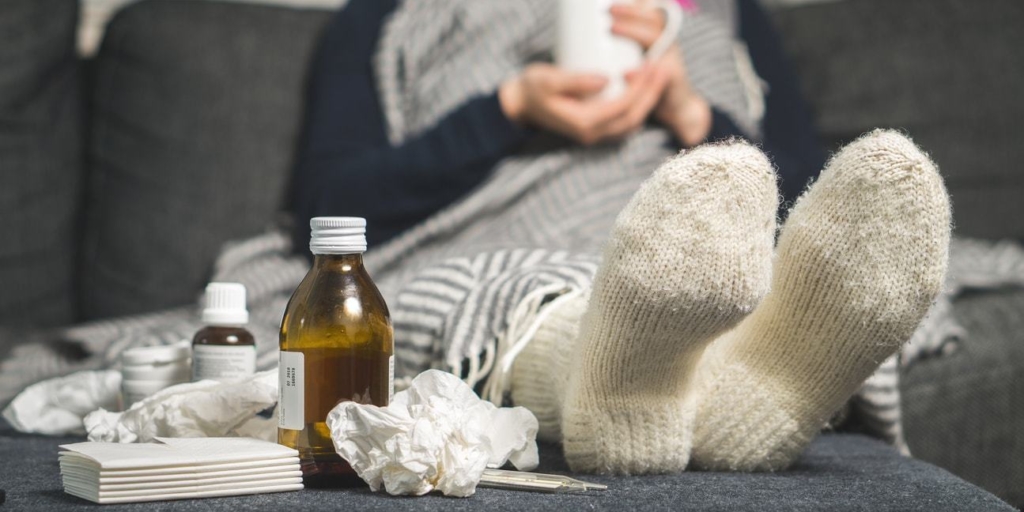Weathering The Cold And Flu

Santa isn’t the only one getting a lot of attention this time of year. Winter is cold and flu’s time to shine, and with all the shopping, decorating, and cooking during the holidays, the last thing you want is to get slowed down by sickness. That is why the CDC highlights the importance of flu prevention, through vaccination, every December. This year’s National Influenza Vaccination Week is December 3-9.
The greater Jackson area is already experiencing large numbers of flu cases. It is important to get your vaccination in time for your body to build up immunity to the virus. It is not too late. The worst of the flu season is still ahead.
Understand It
Influenza and colds are both contagious viral infections in the respiratory system. They both have similar symptoms like coughing and headaches. Colds typically also produce runny nose and congestion, while flu tends to cause fever, body aches, and fatigue in addition. Although some symptoms overlap, flu symptoms tend to come on quickly and be worse overall, but cold symptoms tend to last longer. Because they are both viral infections, they cannot be treated by antibiotics, which is medication for bacterial infections. Occasionally, a bacterial infection occurs as a secondary condition along with cold and flu, in which case antibiotics may be prescribed for that specific issue.
Anyone can get a cold or flu, but some people are at higher risk. Knowing if you fall into one of these categories will help you take additional steps to protect yourself. People whose immune systems are reduced because of other illness, such as HIV, AIDS, and cancer are at a higher risk, along with those who have other chronic ailments like asthma, heart disease, and diabetes. Pregnant women also experience a drop in immune function as resources are redirected to the baby, so even healthy women are more at risk than they would be otherwise. Infants and children under five are at increased risk because their immune systems are not fully developed. Likewise, elderly people over the age of sixty-four are especially likely to get cold and flu because their immune systems have begun to deteriorate. Children and the elderly frequently have the added difficulty of being in settings like day care, school, nursing homes, or hospitals
where they are exposed regularly to illnesses.
Prevent It
It is important to protect yourself since flu can lead to other complications like ear or sinus infection, or in severe instances, serious illnesses like pneumonia, inflammation of organ tissue, and other life-threatening diseases. The most effective way to protect against flu is getting vaccinated. There are more than 100 known strains of flu, so a flu shot cannot protect against all strains you may encounter. That said, research is done to pinpoint the most common strains each year, and the flu vaccine is still the best defense you have against getting sick. December 3-9, 2017, is National Flu Vaccination Week, so celebrate by getting your flu shot if you haven’t done so already.
In addition to a flu shot, there are other things you can make part of your daily routine that will provide added protection against cold and flu. Cold and flu are contagious and spread through respiratory secretions from direct contact or from droplets in the air, making places with large groups of people particularly hazardous. If you are going to be around a lot of people, take extra precautions. Being intentional about cleanliness and hygiene will go a long way toward keeping germs at bay. Wash your hands regularly with soap and water or alcohol-based sanitizer if soap and water are not available—it is a good idea to carry a bottle with you, especially to public places. Avoid touching your face because viruses spread most easily through the eyes, nose, and mouth. Keep your home disinfected and sanitize surfaces that accumulate germs like door knobs, kitchen tables, pillowcases, and bathrooms. Avoid spending too much time with people who are sick, and if you are sick, help keep your illness from spreading by covering your mouth when coughing or sneezing, limiting contact with others, and staying home for at least twenty-four hours after any fever is gone.
Treat It
No matter what you do, you will likely experience cold and flu at some time in your life. When that happens, the old stand-bys really work—rest, fluids, and symptom control. The first two are self-explanatory, but for symptom control, there are a number of options. Many over-the-counter medications treat cold and flu symptoms, but check with your doctor first, especially if you are already taking medications, have a chronic illness, or are pregnant, to make sure there are no dangers involved. Several non-medication remedies help provide relief. Lozenges, honey, apple cider vinegar, and gargling with salt water help with sore throat and cough. Warm liquids also offer relief from scratchy throat, and you’ll stay hydrated too! Saline drops and adding moisture to the air with a cold-mist humidifier can help with stuffiness. Putting a vapor rub on nostrils, chest, and feet can also help with sinus pressure and chest congestion. If you experience any difficulty breathing, dizziness, chest pain, or severe vomiting with cold and flu, seek medical attention immediately.
You don’t ever have to have an appointment to visit TrustCare. Take advantage of National Flu Vaccine Week, no more excuses; stop by one of our convenient locations and see us today!
